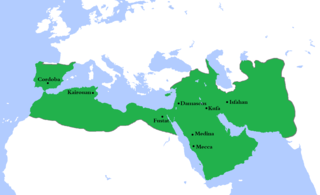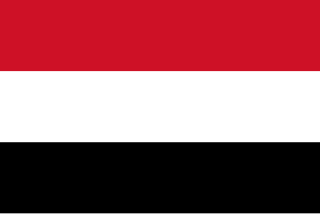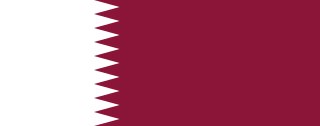
Aluminium is a chemical element with the symbol Al and atomic number 13. It is a silvery-white, soft, non-magnetic and ductile metal in the boron group. By mass, aluminium makes up about 8% of the Earth's crust; it is the third most abundant element after oxygen and silicon and the most abundant metal in the crust, though it is less common in the mantle below. The chief ore of aluminium is bauxite. Aluminium metal is so chemically reactive that native specimens are rare and limited to extreme reducing environments. Instead, it is found combined in over 270 different minerals.

Al-Qaeda is a militant Sunni Islamist multi-national organization founded in 1988 by Osama bin Laden, Abdullah Azzam, and several other Arab volunteers during the Soviet–Afghan War.

Alphonse Gabriel "Al" Capone, sometimes known by the nickname "Scarface", was an American gangster and businessman who attained notoriety during the Prohibition era as the co-founder and boss of the Chicago Outfit. His seven-year reign as crime boss ended when he went to prison at age 33.

The Islamic, Muslim, or Hijri calendar is a lunar calendar consisting of 12 lunar months in a year of 354 or 355 days. It is used to determine the proper days of Islamic holidays and rituals, such as the annual period of fasting and the proper time for the pilgrimage to Mecca. The civil calendar of almost all countries where the religion is predominantly Muslim is the Gregorian calendar. Notable exceptions to this rule are Iran and Afghanistan, which use the Solar Hijri calendar. Rents, wages and similar regular commitments are generally paid by the civil calendar.

Muhammad was an Arab political, social and religious leader and the founder of Islam. According to Islamic doctrine, he was a prophet, sent to present and confirm the monotheistic teachings preached previously by Adam, Abraham, Moses, Jesus, and other prophets. He is viewed as the final prophet of God in all the main branches of Islam, though some modern denominations diverge from this belief. Muhammad united Arabia into a single Muslim polity, with the Quran as well as his teachings and practices forming the basis of Islamic religious belief. He is referred to by many appellations, including Messenger of Allah, The Prophet Muhammad, Allah's Apostle, Last Prophet of Islam and others; there are also many variant spellings of Muhammad, such as Mohamet, Mahamad, Muhamad and many others.

Osama bin Mohammed bin Awad bin Laden, also rendered Usama bin Ladin, was a founder of the pan-Islamic militant organization al-Qaeda. He was a Saudi Arabian citizen until 1994, a member of the wealthy bin Laden family, and an ethnic Yemeni Kindite.

Shia Islam is one of the two main branches of Islam. It holds that the Islamic prophet Muhammad designated Ali ibn Abi Talib as his successor and the Imam (leader) after him, most notably at the event of Ghadir Khumm, but was prevented from the caliphate as a result of the incident of Saqifah. This view primarily contrasts with that of Sunni Islam, whose adherents believe that Muhammad did not appoint a successor and consider Abu Bakr, who they claim was appointed caliph by a small group of Muslims at Saqifah, to be the first rightful caliph after the Prophet.

Sunni Islam is the largest denomination of Islam, followed by 85–90% of the world's Muslims. Its name comes from the word sunnah, referring to the behaviour of the Islamic prophet Muhammad. The differences between Sunni and Shia Muslims arose from a disagreement over the succession to Muhammad and subsequently acquired broader political significance, as well as theological and juridical dimensions.

The Umayyad Caliphate was the second of the four major caliphates established after the death of Muhammad. The caliphate was ruled by the Umayyad dynasty, hailing from Mecca. The third Caliph, Uthman ibn Affan, was a member of the Umayyad clan. The family established dynastic, hereditary rule with Muawiya ibn Abi Sufyan, long-time governor of Syria, who became the sixth Caliph after the end of the First Muslim Civil War in 661. After Mu'awiyah's death in 680, conflicts over the succession resulted in a Second Civil War and power eventually fell into the hands of Marwan I from another branch of the clan. Syria remained the Umayyads' main power base thereafter, and Damascus was their capital.

Riyadh is the capital of Saudi Arabia and Riyadh Province. It is the largest city in Saudi Arabia and one of the most populated cities in the Arab world, with a population of 6.9 million people as of 2018. It is one of the largest Arab cities in area, at a size of 1,913 square kilometers. Riyadh is located on the eastern part of the Najd plateau at about 600 metres above sea level.

The United Arab Emirates, sometimes simply called the Emirates, is a country in Western Asia at the southeast end of the Arabian Peninsula on the Persian Gulf, bordering Oman to the east and Saudi Arabia to the south and west, as well as sharing maritime borders with Qatar to the west and Iran to the north. The sovereign constitutional monarchy is a federation of seven emirates consisting of Abu Dhabi, Ajman, Dubai, Fujairah, Ras Al Khaimah, Sharjah and Umm Al Quwain. Their boundaries are complex, with numerous enclaves within the various emirates. Each emirate is governed by a ruler; together, they jointly form the Federal Supreme Council. One of the rulers serves as the President of the United Arab Emirates. In 2013, the UAE's population was 9.2 million, of which 1.4 million are Emirati citizens and 7.8 million are expatriates.

Yemen, officially the Republic of Yemen, is a country at the southern end of the Arabian Peninsula in Western Asia. It is the second-largest Arab sovereign state in the peninsula, occupying 527,970 square kilometres. The coastline stretches for about 2,000 kilometres. It is bordered by Saudi Arabia to the north, the Red Sea to the west, the Gulf of Aden and Guardafui Channel to the south, and the Arabian Sea and Oman to the east. Yemen's territory encompasses more than 200 islands, including the largest island in the Middle East, Socotra. Yemen is a member of the Arab League, United Nations, Non-Aligned Movement and the Organisation of Islamic Cooperation.

Sheikh Mohammed bin Rashid Al Maktoum is the Vice President and Prime Minister of the United Arab Emirates (UAE), and ruler of the Emirate of Dubai. Since his accession in 2006, after the death of his brother Sheikh Maktoum, he has undertaken reforms in the UAE's government, starting with the UAE Federal Government Strategy in April 2007. In 2010, he launched the UAE vision 2021 with the aim of making the UAE 'one of the best countries in the world' by 2021.

Global warming is long-term rise in the average temperature of the Earth's climate system, an aspect of current climate change shown by temperature measurements and by multiple effects of the warming. The term commonly refers to the mainly human-caused observed increase in global surface temperatures and its projected continuation. In this context the terms global warming and climate change are commonly used interchangeably, but climate change includes both global warming and its effects, such as changes to precipitation and impacts that differ by region. There were prehistoric periods of global warming, but many observed changes since mid 20th century have been unprecedented compared to records over decades to thousands of years.
Islam is an Abrahamic, monotheistic religion teaching that there is only one God, and that Muhammad is the messenger of God. It is the world's second-largest religion with over 1.8 billion followers or 24% of the world's population, most commonly known as Muslims. Muslims make up a majority of the population in 50 countries. Islam teaches that God is merciful, all-powerful, and unique, and has guided mankind through prophets, revealed scriptures and natural signs. The primary scriptures of Islam are the Quran, claimed to be the verbatim word of God, and the teachings and normative examples of Muhammad.

Qatar, officially the State of Qatar, is a country located in Western Asia, occupying the small Qatar Peninsula on the northeastern coast of the Arabian Peninsula. Whether the sovereign state should be regarded as a constitutional monarchy or an absolute monarchy is disputed. Its sole land border is with neighbouring Gulf Cooperation Council (GCC) monarchy Saudi Arabia to the south, with the rest of its territory surrounded by the Persian Gulf. The Gulf of Bahrain, an inlet of the Persian Gulf, separates Qatar from nearby Bahrain.

The Islamic State of Iraq and the Levant, also known as the Islamic State of Iraq and Syria, officially known as the Islamic State (IS) and also known by its Arabic language acronym Daesh, is a Salafi jihadist militant group and former unrecognised proto-state that follows a fundamentalist, Salafi doctrine of Sunni Islam. ISIL gained global prominence in early 2014 when it drove Iraqi government forces out of key cities in its Western Iraq offensive, followed by its capture of Mosul and the Sinjar massacre.

Bahrain, officially the Kingdom of Bahrain, is an island country in the Persian Gulf. The sovereign state comprises a small archipelago centered around Bahrain Island, situated between the Qatar peninsula and the north eastern coast of Saudi Arabia, to which it is connected by the 25-kilometre (16 mi) King Fahd Causeway. Bahrain's population is 1,234,561, including 666,172 non-nationals. It is 765.3 square kilometres (295.5 sq mi) in size, making it the third-smallest nation in Asia after the Maldives and Singapore.

Alfred Matthew "Weird Al" Yankovic is an American singer-songwriter, record producer, satirist, actor, voice actor, music video director, comedian, and author. He is known for his humorous songs that make light of popular culture and often parody specific songs by contemporary musical acts, original songs that are style pastiches of the work of other acts, and polka medleys of several popular songs, featuring his favored instrument, the accordion.
Al Jazeera, is a state-funded broadcaster in Doha, Qatar, owned by the Al Jazeera Media Network. Initially launched as an Arabic news and current-affairs satellite TV channel, Al Jazeera has since expanded into a network with several outlets, including the Internet and specialty television channels in multiple languages.




















